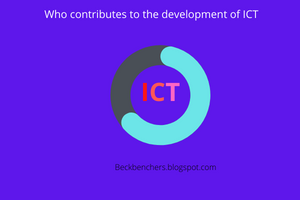Who contributes to the development of ICT
Who contributes to the development of ICT
Who contributes to the development of ICT, ICT Full meaning, Development of ICT process.
ICT Full meaning
(Information and Communications Technology) is called Information and Communication Technology in Bengali. Many scientists, dreamers, engineers, and manufacturers have contributed to the development of information and communication technology today.
Wireless and wireless communication systems, increasing the computing power of computers, and microelectronics have now brought ICT into the fold.
Development of ICT process
1. Charles Babbage (1791-1871)
The development of modern computers began with Charles Babbage. He was an English engineer and mathematician. Charles Babbage is said to be the father of the modern computer. He built the Difference Engine.
An engine, as described by Charles Babbage, was built in 1991 at the Science Museum in London. It turned out that it was working properly and later he planned a calculator called Analytical Engine.
2. Ada Loveless (1815-1852)
When he became acquainted with Charles Babbage in 1842, he introduced the idea of programming to utilize Charles Babbage's analytical engine.
That's why Ada Loveless is credited with pioneering the concept of programming. He researched how to make calculations more effective.
In 1842, Charles Babbage spoke at the University of Turin about his engine. At the time, Ada Loveless sorted the engine's work style step by step with a statement from Charles Babbage.
When the note was reprinted in 1953, 100 years after his death, scientists realized that Loveless had developed the concept of algorithm programming.
3. Scientist James Clark Maxwell (1831-1879)
He first introduced the concept of electromagnetic force. It is known that the concept of an electromagnetic ball creates an infinite possibility for sending messages without wires.
4. Scientist Jagadish Chandra Bose (1874-1937)
Bengali scientist Jagadish Chandra Bose was the first to succeed in sending messages from one place to another without wires.
In 1895, Jagadish Chandra Bose was able to transmit information from one place to another using very small waves. But his discovery was not publicized as it was not published.
5. Italian scientist Guglielmo (1874-1937)
He received universal recognition for his work on radio waves, which was first published. This is why he is recognized as the inventor of the radio device.
6. IBM Company of the United States (1971)
IBM was the first US company to make mainframe computers after the development of electronics. The discovery of the microprocessor in 1971 gradually paved the way for the creation of affordable computers.
7. American programmer Raymond Samuel
Arpanet was invented in the sixties and seventies of the twentieth century, using Internet Protocol. It can be said that since then the interconnection between computers through the network has started to develop and as a result of this development internet has been created.
He introduced the first email system through him in 1971 and called for the introduction of correspondence through ARPANET ELECTRONIC.
8. Steve Jobs, Steve Wozniak, and Ronald Wayne (1955-2011)
With the advent of the microprocessor, personal computers were used, especially in the United States. Through Steve Jobs and his two friends Steve Wozniak and Ronald Wayne.
On April 1, 1976, Apple Computer launched an organization called Computer. The company is currently one of the largest in the world. Apple has developed various stages of personal computers.
9. William Henry Bill Gates
In 1981, IBM commissioned William Henry Bill Gates and his friends, Microsoft, to develop the operating systems for their personal computers.
Developed MS-DOS and Windows operating systems. Most computers in the world today are powered by the operating system software of the Microsoft company founded by Bill Gates.
10. Sir Timothy John Barnes Lee
In 1989, a British computer scientist named Hypertext Transfer Protocol (HTTP) proposed and implemented data management. He is known as the father of world-wide-web (www).
As a result of the tremendous development of network technology, the use of the internet has spread among the maximum number of countries in the world.
So a huge economic system was formed around the internet and different types of application software were invented.
11. Mark Zuckerberg
The most popular social media in the world today is Facebook. Facebook was started by Harvard University student Mark Zuckerberg and four of his friends. Initially, it was limited to university students, but now many are using Facebook.
The number of Facebook users is
increasing every day. Many of us in Bangladesh use Facebook as a medium of
social communication.
See more posts: Shortcut keys of Computer A to Z




Computer is our daily life partner.
ReplyDeleteGreat post!!!
ReplyDelete